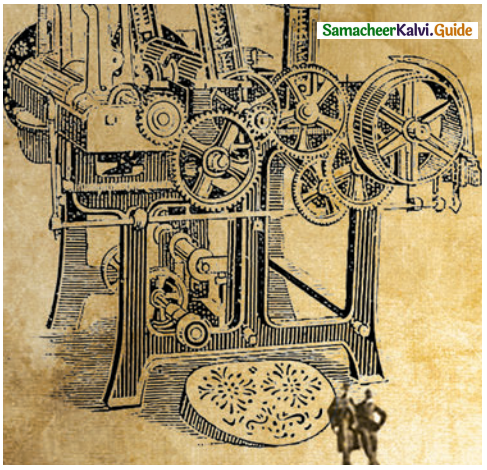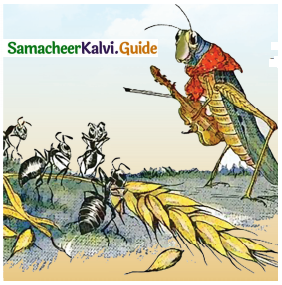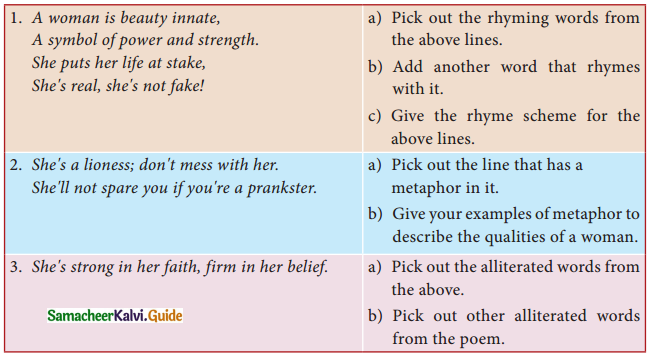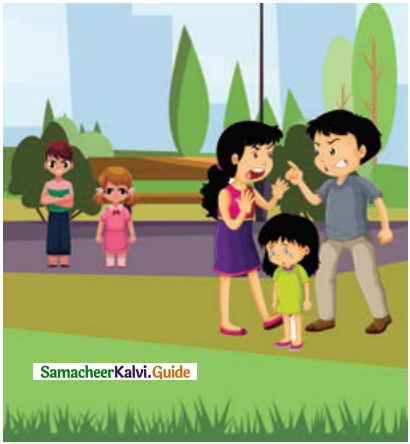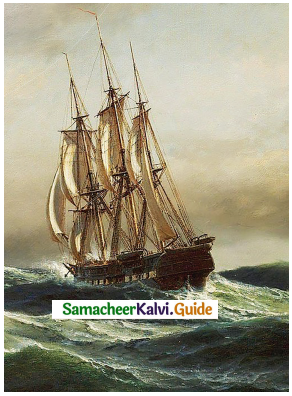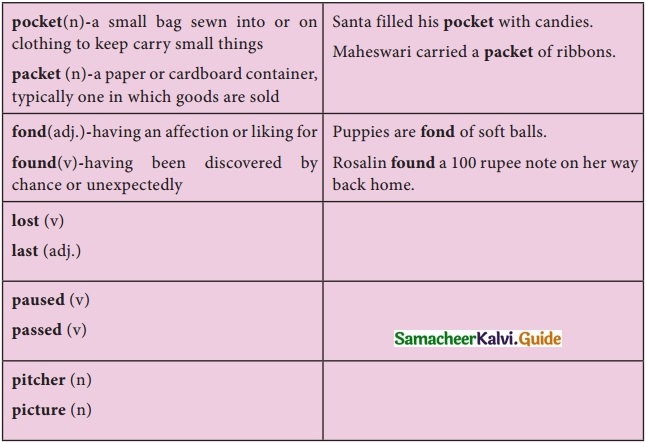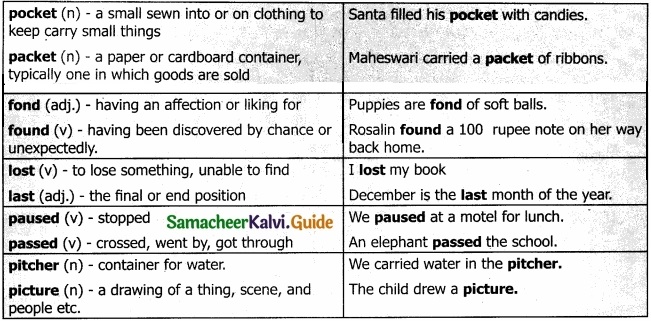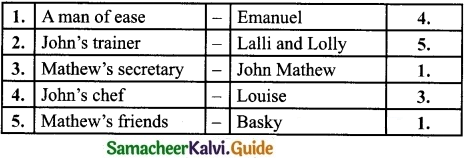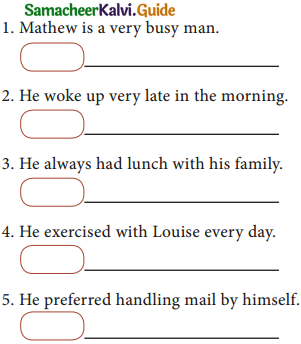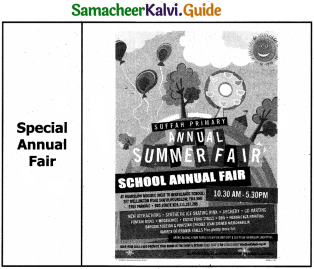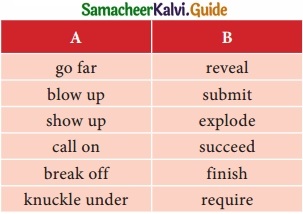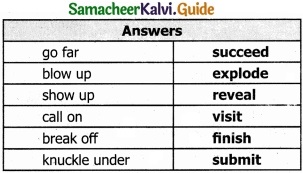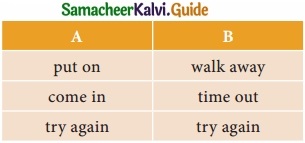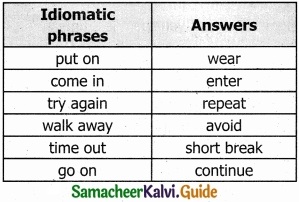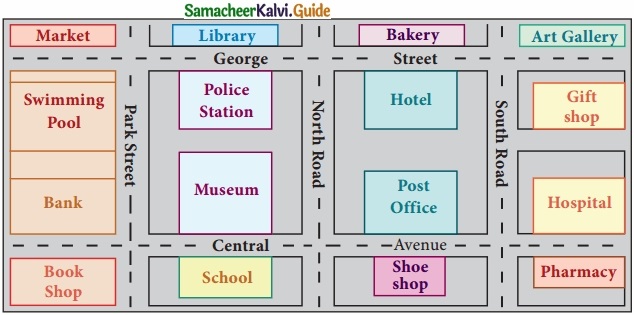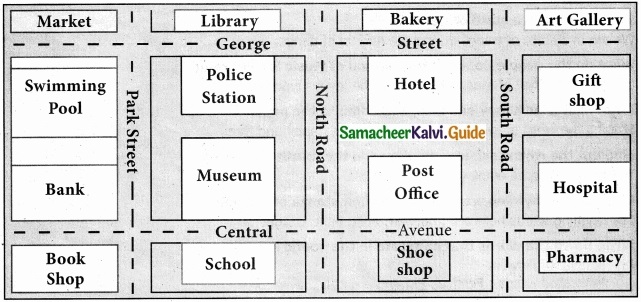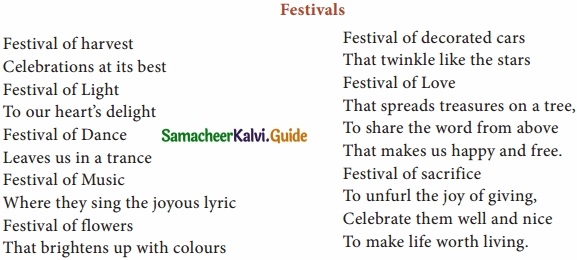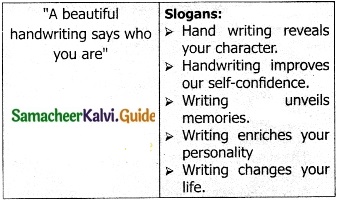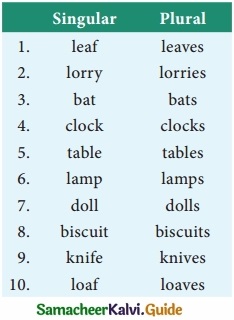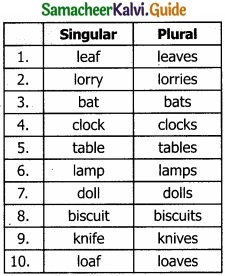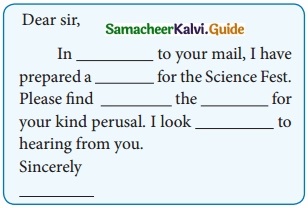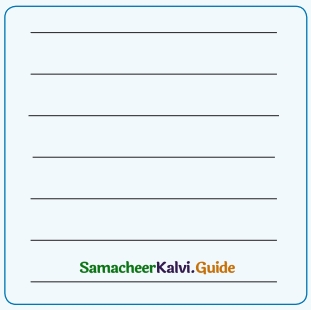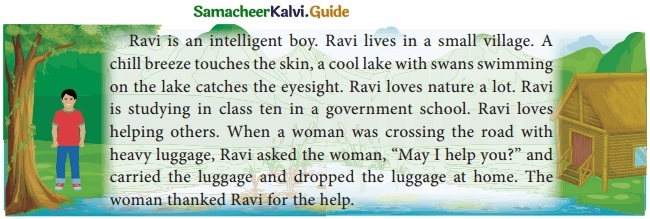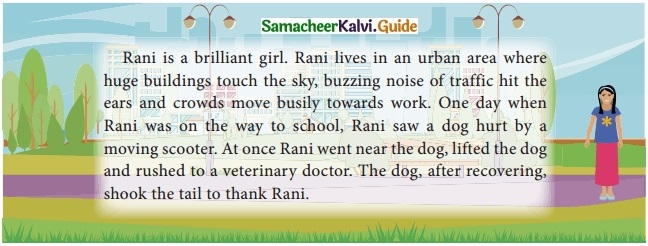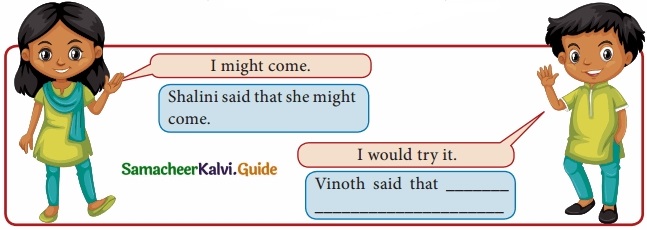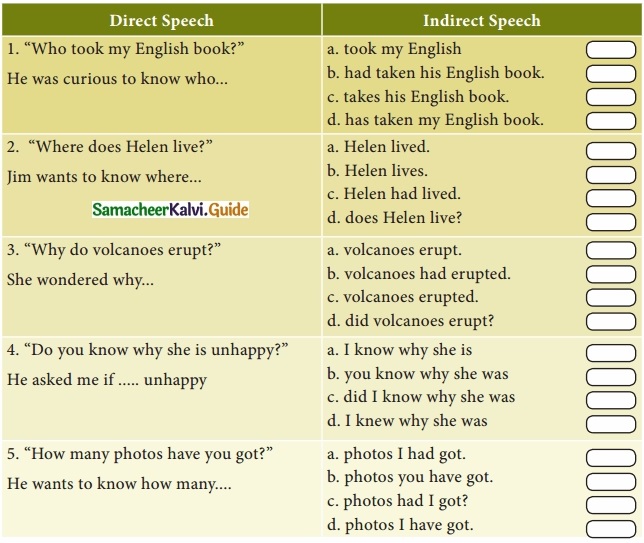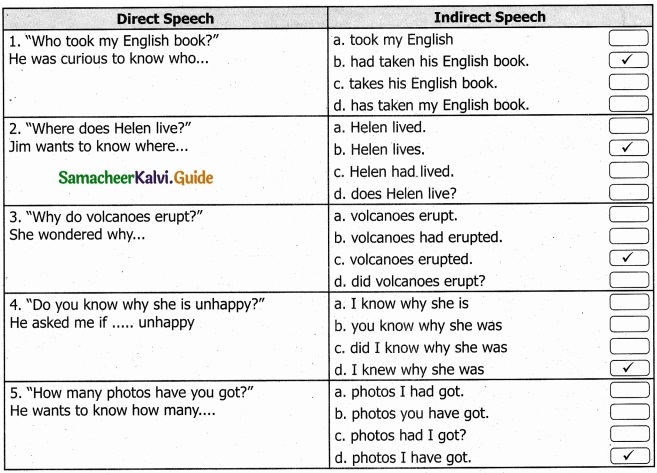Tamilnadu State Board New Syllabus Samacheer Kalvi 10th English Guide Pdf Poem 7 The House on Elm Street Questions and Answers, Summary, Notes.
Tamilnadu Samacheer Kalvi 10th English Solutions Poem 7 The House on Elm Street
10th English Guide The House on Elm Street Textbook Questions and Answers
A. Read the given lines and answer the questions given below.
1. It sat alone.
What happened there is still today unknown.
It is a very mysterious place,
And inside you can tell it has a ton of space,
But at the same time, it is bare to the bone.
(a) What does ‘It’ refer to?
(b) Pick out the line that indicates the size of the house?
(c) What is unknown to the poet?
(d) Why is the house a mysterious place?
(e) Find out the rhyming words in the above stanza?
(f) What is the figure of speech in the 1st line?
(g) What is the figure of speech in the 4th line?
Answers:
(a) ‘It’ refers to the mysterious house.
(b) And inside you can tell it has a ton of space, – this line indicates the size of the house.
(c) What happened inside the house
(d) No one knows what is happening inside the house. So it is a mysterious place.
(e) alone – unknown – bone; place – space
(f) Personification
(g) Synecdoche
![]()
2. “I drive past the house almost every day.
The house seems to be a bit brighter.
On this warm summer day in May.
It plays with your mind.
To me I say, it is the one of a kind”
(a) To whom does ‘I’ refer to?
(b) Pick out the alliterated words in the 2nd line.
(c) When does the poet drive past the house?
(d) What is the season mentioned here?
(e) What plays with our mind?
(f) Pick out the alliterated words in the 1st line?
(g) Find out the rhyming words in the above stanza?
(h) What is the rhyme scheme mentioned in the above stanza?
Answers:
(a) ‘I’ refers to the poetess, Nadia Bush.
(b) The alliterated words in the second line are a bit brighter.
(c) The poet drives past the house every day.
(d) The summer season is mentioned here.
(e) The mystery of the house plays with our minds.
(f) drive – day.
(g) day – may; mind – kind
(h) abacc
![]()
3. It never grows leaves,
Not in the winter, spring, summer, or fall.
It just sits there never getting small or ever-growing tall
How could this be?
(a) What does ‘it’ refer to?
(b) In what way the tree is a mystery?
(c) What are the reasons mentioned here?
(d) Where does a tree sit?
(e) Pick out the alliterated words in the 4th line?
(f) Find out the rhyming words in the above stanza?
(h) What is the literary device used in the 3rd line?
Answers:
(a) ‘It’ refers to the tree that is beside the house.
(b) ‘It’ refers to the tree that is beside the house.
(c) The tree is a mystery because no leaves grow in it during any one of the season. It neither grow tall nor does it become short.
(d) A tree sits besides the house
(e) getting – growing
(f) tree – be; fall – tall
(g) abcca
(h) Paradox is the literary device.
![]()
4. “Rumours are conšlandy being made,
And each day the house juši begins to fade.
What happened inside thai house?”
(a) Does the house remain the same every day?
(b) Why does the poet consider the house to be a mystery?
(c) What rumours may be made about the house?
(d) Find out the rhyming words ¡n the above stanza?
(e) What is the rhyme scheme mentioned in the above stanza?
(f) What is the figure of speech In the 2nd line?
Answers:
(a) No, the house doesn’t remain the same everyday.
(b) The poet does not know what is happening in the house
(c) There may be a ghost in the house
(d) made – fade
(e) aab
(f) Hyperbole
![]()
5. “What happened inside thai house?
I really don‘t know
I guess ii will always be a myšlery”
(a) Does the poet know what happened in the house?
(b) What is the mystery about the house?
Answers:
(a) No, the poetess doesn’t know what happened in the house.
(b) The mystery about the house is nothing but the fact that no one will know what is happening inside the house.
Additional Questions and Answers
1. “At night the house seems to be alive,
Lights flicker on and off
I am often tempted to go to the house,
To just take a look and see what it is really about,
But fear takes over me”
(a) When does the house seem to be alive?
(b) What happened in the house at night?
(c) Does the poet go to the house?
(d) What stopped the poet from going to the house?
Answers:
(a) The house seems to be alive at night
(b) The lights ¡n the house flicker on and oft
(c) No, the poet does not go to the house
(d) It Is her fear.
![]()
2. At night the house seems to be alive
Lights flicker on and off
(a) How does the house seen to be at night?
(b) What happens to th, lights?
Answrs:
(a) The house seems to be alive at night,
(b) The lights flicker on and off.
3. I am often tempted to go to the house
To just take a look and see what it is really
about
But fear takes over me.
(a) What is the temptation of the poet?
(b) Why did the poet want to go to the house?
(c) Did the poet enter the house? Why?
Answers:
(a) The poet is often tempted to go to the house.
(b) The poet wanted to go to the house to look and see the reality about it.
(c) No, the poet didn’t enter the house because he was afraid to go in.
![]()
4. Beside the house sits a tree.
It never grows leaves
(a) Where does a tree-sit?
(b) What Is strange about the tree?
Answers:
(a) A tree sits beside the house.
(b) The tree never rows leaves. This is strange about the tree.
B. Answer the following in a paragraph.
Question 1.
Where is the house located? Why is it a mysterious place?
Answers:
The house is located on Elm Street. There isn’t any house around it. It stood all alone in an isolated place on Elm Street. Next to the house, is a tree. The tree to is mysterious like the house since no leaves sprout in any of the seasons. It is said to be a mysterious place ’ since no one knows who lives there or what is inside. No one knows what happens inside that house and hence it is very mysterious. It is for sure a big house with vast space inside the house. Generally, at night, the house looks like it is alive with people in it.
Lights are switched on and off. Every day the poetess drives past the house. The house seems to look a bit brighter on a fine warm summer day in the month of May. The very thought of this mysterious house plays with your mind since it is just one house of this kind in the areas known around. Likewise, the tree too is barren during winter, spring, summer and autumn. The poetess says that the tree just stays there and never grows tall nor becomes short. She wonders how a tree could survive without any leaves or without any growth and hence feels it is a mysterious place.
‘The mystery of existence will always remain a mystery and secret.”
(OR)
Poem: The house of Elm Street
Poet: Nadia Bush
Theme: Mystery of the house
The house is located on Elm Street. It is very big. It is there alone. No one knows about the house. At night the lights flicker on and off. Besides the house, there is a leafless tree.
It has no leaves in winter, spring, summer or fall. It is never getting small or growing tall. There are rumours spread about the house. Every day the house begins to fade. No one knows what happened inside the house. The poet wishes to go into the house. But fear overcome her wish. It is a mysterious house.
(OR)
- The house is in Elm Street.
- It is there alone.
- It is big and simple.
- No one lives there.
- At night light flickers.
- There is a tree without leaves.
- It is never getting small or growing tall.
- No one knows what happened inside.
- It is a mysterious house.
![]()
Question 2.
How is the mystery depicted in the poem?
Answers:
Introduction:
The poem “The house on Elm Street” tells us about a mysterious house. The house remains a mystery for the poet.
Mystery of the house:
It is a lonely place. It has a lot of space but it is empty. The house looks brighter in the hot summer. The poet doesn’t know what happens inside the house. There is a tree near the house. It never grows leaves. It neither grows tall nor gets smaller. It remains the same.
Poet’s describing theme:
The house begins to fade each day. Rumours are constantly made. But no one knows what happens inside the house. The poet tells that our life in this world is a mystery. We can’t go deep inside to know the purpose or mystery behind our life.
Conclusion:
Thus the poet doesn’t go inside the house. And the house remains a mystery forever.
(OR)
There is a house. It is alone at Elm street. It has plenty of space but remains empty. The lights go on and off at night. The poet is eager to enter the house and see but she is afraid. The house is brighter during the day. There is a tree near the house. It has no leaves. It neither grows tall nor becomes small. It is the same in all seasons. Every day the house begins to fade. The poet does not know what happens there. Thus the house remains a mystery forever.
(OR)
- The house is lonely,spacious but empty.
- At night lights go on and off.
- The poet is afraid of going inside.
- There is a bare tree near the house.
- It grows neither tall nor small in all seasons.
- The rumours spread constantly.
- Each day the house begins to fade.
- The poet does not know what happens
- Thus the house is a mystery forever.
C. Read the poem and write the rhyming words and rhyme scheme for the given stanzas.

Answer:
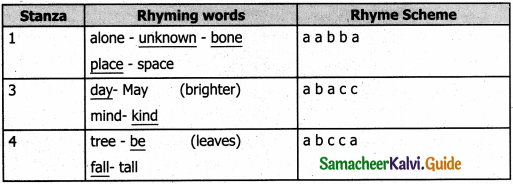
D. Identify the poetic lines where the following figures of speech are employed and complete the tabular column.
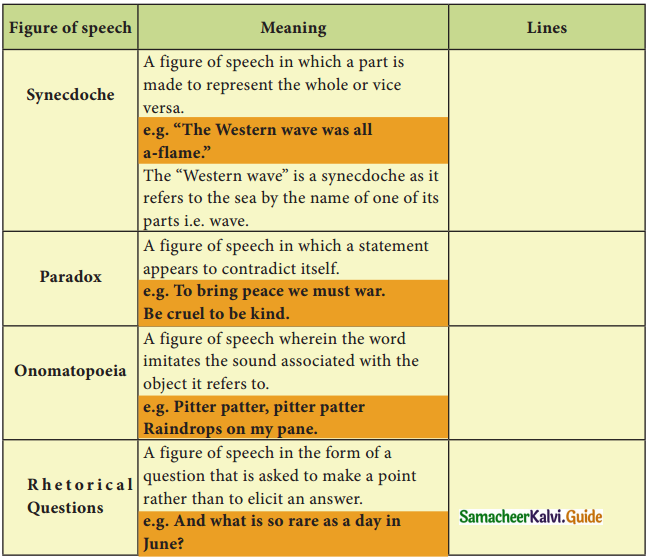
Answer:
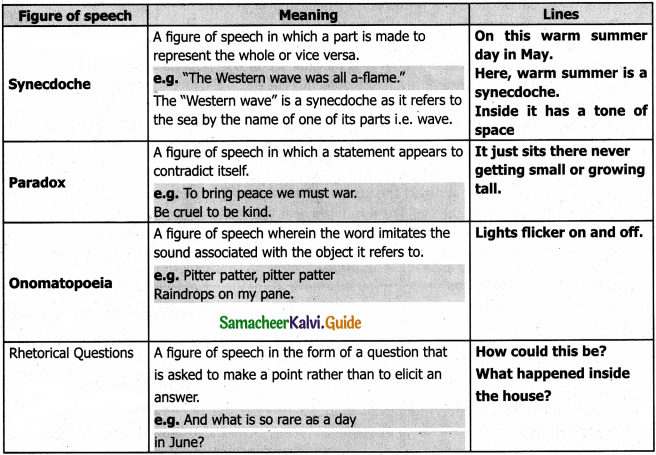
The House on Elm Street Summary of the poem
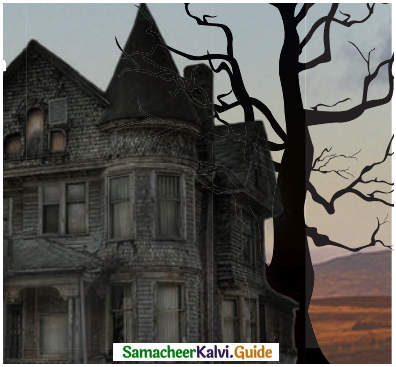
The poem ‘The house on ELM street’ describes a mysterious house and a never growing tree. The poet fears to go inside the house. No one knows, what happened inside the house. It remains to be a mystery. The house begins to fade each day. The house remains to be a mystery always. Besides the house sits a tree which never grows leaves in any season. The poet metaphorically tells that our life ¡n this world is a mystery. We can’t go deep inside to know the purpose of the mystery behind our life.

